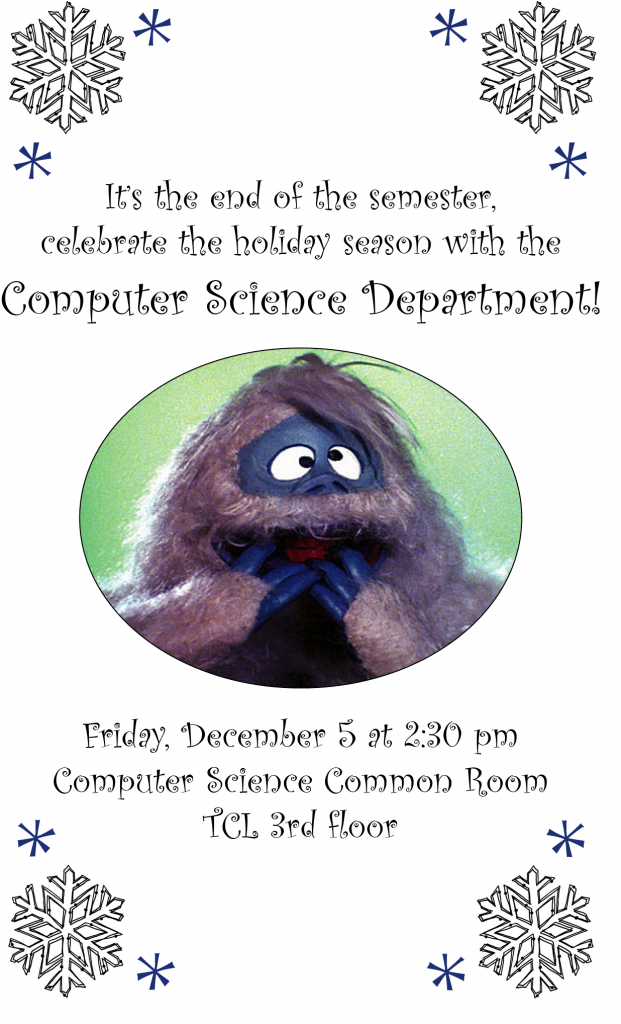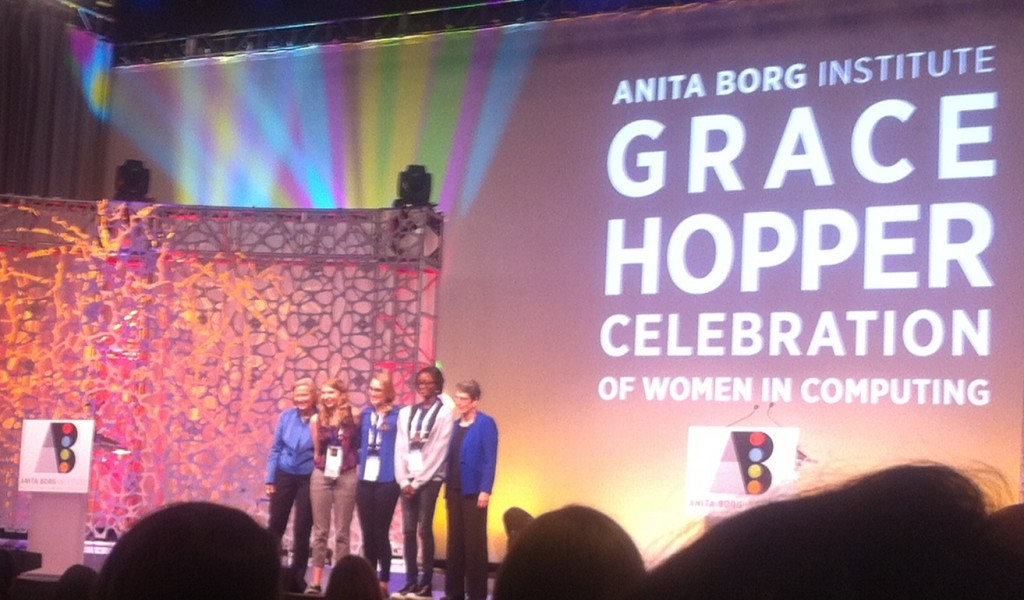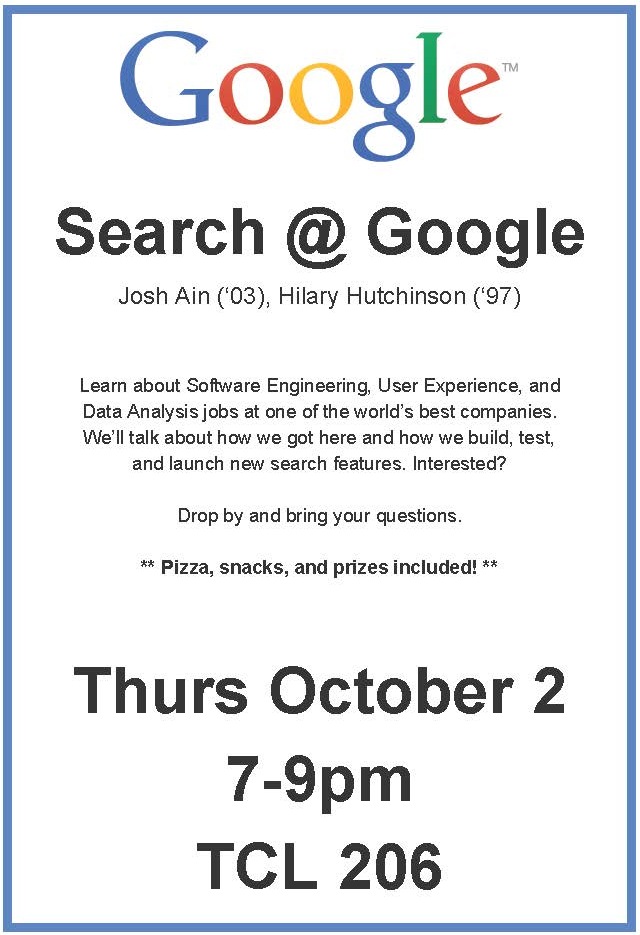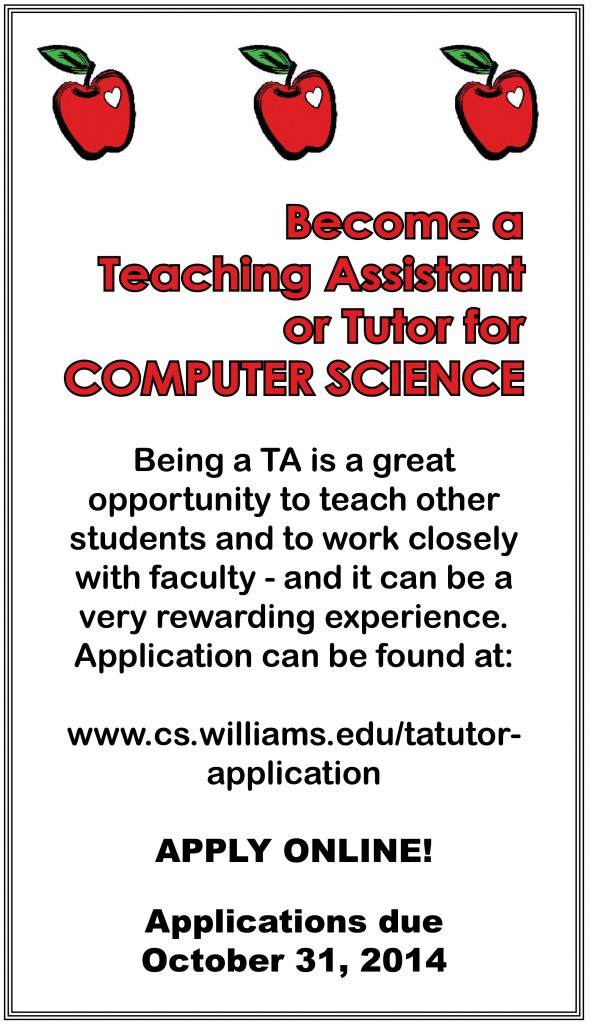
News & Events
CS Spring Semester Preregistration Info Session – October 27 at 9:00 pm in CS Lounge
Here’s a list of courses offered Spring 2015:
Office of the Registrar, Spring 2015 Catalog, Computer Science
CSCI 107: Creating Games McGuire
107-01 (LEC) TR 8:30-9:45
107-02 (LAB) R 1:00-4:00
CSCI 134: Introduction to Computer Science (Q) Danyluk, Freund
134-01 (LEC) MWF 9:00-9:50
134-02 (LEC) MWF 10:00-10:50
134-03 (LAB) M 1:00-4:00
134-04 (LAB) T 1:00-4:00
134-05 (LAB) M 7:00-10:00
CSCI 135: Diving into the Deluge of Data (Q) Heeringa
135-01 (LEC) MWF 9:00-9:50
135-02 (LAB) R 1:00-2:25
135-03 (LAB) R 2:35-4:00
CSCI 136: Data Structures and Advanced Programming (Q) Yorgey
136-01 (LEC) MWF 10:00-10:50
136-02 (LAB) W 12:00-1:55
136-03 (LAB) W 2:05-4:00
CSCI 256: Algorithm Design and Analysis (Q) Lenhart
256-01 (LEC) MWF 10:00-10:50
CSCI 334: Principles of Programming Languages (Q) Freund
334-01 (LEC) TR 9:55-11:10
CSCI 356: Advanced Algorithms (Q) Lenhart
356-T1 (TUT) TBA
CSCI 398: Reading Heeringa
398-01 (IND) TBD
CSCI 432: Operating Systems (Q) Bailey
432-01 (LEC) TR 8:30-9:45
432-02 (LAB) R 1:00-2:25
432-03 (LAB) R 2:35-4:00
Emma Harrington ’15 wins award at Grace Hopper Conference
Emma Harrington (pictured center) won second place in the ACM undergraduate student research competition at the Grace Hopper Conference for her work on “Using Escape Analysis in Dynamic Data Race Detection” with Prof. Steve Freund.

Dartmouth Triple Header – Xia Zhou and Andrew Campbell
Wednesday, November 5 in TCL 206
1:00 pm — Networking in the Light
1:15 pm — StudentLife App: A term in the life of a Dartmouth Class
1:35 pm — Q&A on Dartmouth as a place for graduate studies in CS
This event will count as colloquium credit for CS majors.
Xia Zhou
Networking in the Light
Mobile computing is accelerating beyond the smartphone era. The advent of new wearables and health sensors is placing significant new demands on the already limited radio spectrum. To stave off the radio spectrum crunch, there is a need for a radically different thinking. In this talk, I will discuss the potential of using the visible light around us to mitigate the radio spectrum crunch, and our vision of the next-generation smart spaces powered by visible light communication.
Andrew Campbell
StudentLife App: A term in the life of a Dartmouth Class
Why do some students do better than others? Under similar conditions, why do some individuals excel while others fail? Why do students burn out, drop classes, even drop out of college? What is the impact of stress, mood, workload, sociability, sleep and mental health on academic performance (i.e., GPA)? The StudentLife study used an android app we developed for smartphones carried by 48 students over a 10 week term to find answers to some of these pressing questions.

TA Applications due October 31
NSF article features Jeannie Albrecht
Jeannie Albrecht Awarded NSF Grant
EAGER: Scalable Energy Monitoring and Visualization in a Living Building
The International Living Future Institute (ILFI) is encouraging programs that assist in the development of “greener” buildings that are also architecturally interesting. The Living Building Challenge (LBC) is a building certification program, administered by the ILFI, which measures sustainability. Williams College is pursuing the LBC as part of the Kellogg House renovation project. The Kellogg House was originally built in 1794, and upon completion of the renovation project, it will be the first historic building in the country to achieve LBC certification with “net-zero” energy usage.
This grant supports instrumenting the house with sensors and devices that accurately monitor and display energy consumption and generation. This instrumentation is crucial for measuring energy usage and guiding occupant behavior. The main contribution of this project, therefore, will be the development of a scalable and robust sensing infrastructure that may serve as a model for future LBC participants. The energy usage data that is collected from the building will be anonymized and made publicly available. These data will facilitate future research in sustainability worldwide. Once completed, the Kellogg House will serve as a learning laboratory, teaching occupants to lead more sustainable lives even beyond the confines of the house.
Stephen Freund Awarded NSF Grant to Study Scalability-Oriented Optimization
Engineering Search @ Google

Ethan Zuckerman, MIT
Saving the World with Computer Science?
Williams College will be awarding Ethan Zuckerman a Bicentennial Medal during convocation this weekend. On September 19, while Ethan is on campus, he will be giving a talk in the Computer Science department. There will be a lunch reception in the Computer Science lounge at 11:45 am, followed by Ethan’s talk, “Saving the World with Computer Science?” at 12:10 pm in TCL 202.

Ethan Zuckerman is director of the Center for Civic Media at MIT, and a principal research scientist at MIT’s Media Lab, where he heads research on Media Cloud, a system for quantitative analysis of agenda setting in digital media, and Promise Tracker, a platform that allows citizens to monitor powerful institutions using mobile and web technologies. He is the author of “Rewire: Digital Cosmopolitans in the Age of Connection”, published by W.W. Norton in June 2013. With Rebecca MacKinnon, Ethan co-founded international blogging community Global Voices. Global Voices showcases news and opinions from citizen media in over 150 nations and thirty languages. Ethan’s research focuses on issues of internet freedom, civic engagement through digital tools and international connections through media. He blogs at http://ethanzuckerman.com/blog and lives in the Berkshire Mountains of western Massachusetts.
